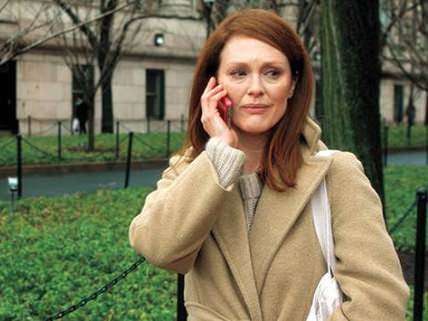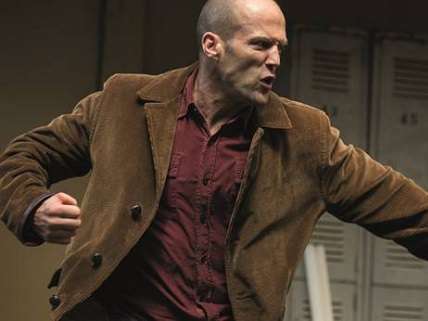Still Alice and Wild Card
Julianne Moore at a new peak, Jason Statham in search of action.


Julianne Moore has already won Golden Globe and Screen Actors Guild awards for her performance in Still Alice, and she may well win the Academy Award for which she's been nominated. Not a lot of people have seen this movie, but that could change when it expands nationwide next week. It might be a hard sell, though. Any picture that begins with a woman succumbing to Alzheimer's disease is clearly not headed for a happy place—which is, understandably, the preferred destination for many moviegoers. But Moore, playing a woman who has it all but steadily loses it as her disease eats away at her mind and slowly erases her personality, is sensational. She's all the reason anyone might need to see the film, which unfortunately offers little else to command our attention.
Moore's character, Alice Howland, is a professor of linguistics at Columbia University. She lives with her doctor husband, John (Alec Baldwin), in a spacious Manhattan townhouse filled with the tasteful trappings of upper-class prosperity. We meet Alice at her fiftieth-birthday party, a celebration at which two of her grown children (Kate Bosworth and Hunter Parrish) are also in attendance. Alice seems entirely happy, but dark clouds are beginning to gather. First she starts losing her train of thought in conversation, and stretching to recall words. Jogging around the Columbia campus one day, she becomes disoriented, not recognizing her once-familiar surroundings. In a classroom, she has to ask students what the day's subject is supposed to be. "I've got something wrong with me," she finally tells her husband.
Alice thinks she might have a brain tumor, but after she undergoes an MRI, a doctor tells her it's something much worse: she has early-onset Alzheimer's, a disease for which there is no cure. As the fog in her mind thickens, she begins to despair. "I feel like my brain is dying," she says, "and everything I've worked for my whole life is going."
The movie is based on a 2007 novel, originally self-published, by former Harvard neuroscientist Lisa Genova. As adapted by co-directors Richard Glatzer and Wash Westmoreland, the story is blandly straightforward and unsurprising—we know where it has to go, and it does. And the flat dialogue gives the actors little to work with. ("Whatever happens, I'm here," John tells his deteriorating wife.) There's also a subplot involving another daughter, an unsuccessful actress named Lydia (Kristen Stewart), that's supposed to pay off at the movie's conclusion but mostly feels like extrinsic plot clutter.
Moore, however, lifts the movie to grand heights of character revelation. At one point, Alice, on the verge of literally losing her mind, comes upon a message on her computer—a filmed communication she recorded at the outset of her ordeal, addressed to the diminished woman she has since become. The contrast here—between the old Alice, beautiful and beaming with life, and the new one, withered and dulled—is an unforgettable demonstration of great acting by a performer at the peak of her interpretive powers.
Moore is a Hollywood star who has continued to lend her big-name presence to enterprising indies like The Kids Are All Right, Chloe, and Savage Grace. In a career that has now lasted more than 20 years, she seems still to be in search of new things, new entryways into the complexity of human personality. Here, she has succeeded once again.

Wild Card
Why it was thought to be a good idea to remake Heat, a 1986 Burt Reynolds movie of no clamoring distinction, is anybody's guess. But here it is, retitled Wild Card, with Jason Statham installed in the Reynolds role as Nick Wild, a Las Vegas bodyguard who rents out his services to visiting high-rollers. (Reynolds' character was surnamed Escalante, but Escalante Card was presumably thought to be a nonstarter, title-wise.) Statham is one of the most appealing of action stars, a performer whose low-key warmth has carried him nicely between bouts of spectacular mayhem in the Transporter and Expendables films, among others. Wild Card is a little light on action, though, and Statham's narrow range as an actor is unfairly tested by the film's narrative wallows. It's not a bad movie, really—it does offer occasional eruptions of gratifying whomp-and-stomp. It's just not a great Statham movie.
William Goldman's original script has been dutifully reheated, with a number of good actors brought in to generally waste their time. Nick works out of the office of a lawyer called Pinky (Jason Alexander, briefly seen). There he's approached by a newly arrived young software millionaire named Cyrus (Michael Angarano). Cyrus wants to do some high-stakes gambling, and he wants his body guarded. What he's really after, though, is a mentor, someone to help him become a man. Like Nick, you see.
Nick's not a promising candidate to mentor anyone. In his free time he's a compulsive gambler, knocking back double vodkas and hemorrhaging money at a Golden Nugget blackjack table run by sympathetic dealer Cassandra (Hope Davis). He's also engaged in helping out a call girl of his acquaintance named Holly (Dominik Garcia-Lorido), who's been raped and beaten in the hotel suite of a mob creep named Danny DeMarco (Milo Ventimiglia). When Holly asks Nick to pay DeMarco a retaliatory visit, we immediately perk up in anticipation of a good bone-snapping Statham fight scene. Which we get, along with some bonus genital scissor-menacing.
But director Simon West can't stop the plot from rearing its fuzzy head. So we trail Nick to Cassandra's blackjack table, where she starts slapping down cards—wap wap wap—in predictable mini-montages, and Nick starts winning for a change. Now we learn that he has a dream—to rake in enough cash to finance his relocation to the Mediterranean isle of Corsica. Why Corsica? That's not entirely clear. Since the filmmakers did actually go to the expense of shooting there, I think we can assume that this plot strand succumbed to digital scissor-menacing in the edit suite.
Anyway, Nick keeps butting heads with DeMarco, to the point that a mob macher called Baby (Stanley Tucci) has to be called in to cool things out. (Tucci, like Hope Davis, is slumming here, as is Sofia Vergara, who's wasted as somebody's sort-of girlfriend.) Eventually, there's a rousing five-man clobber-fest spiked with agreeably nasty knife work—the sort of thing at which Statham, who does his own stunts, continues to rule. If only there were more of this. But the movie expends too much time showing our guy dolefully drinking or gambling or driving around Vegas looking thoughtful, or pissed, or possibly, like us at a couple of points, just bored. This man needs more action to bring him alive. So do we.


Show Comments (23)